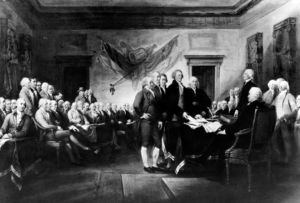Founding Fathers on Wealth
July 5, 2024
To Inform:

The fourth of July is a holiday where I can’t help but think about those 56 men who signed the Declaration of Independence. Merchants, farmers, lawyers – this merry band took tremendous risks. What gave them the confidence to take these risks? I think their wealth and the wise use of it were important but rarely talked about reasons as to why a disgruntled group of British colonists took on the world’s strongest empire. Here’s what Benjamin Franklin had to say about the purpose of money: “The purpose of money is to purchase the freedom to pursue that which is useful and interesting.” This is merely scratching the surface, though, of what our Founders had to say about wealth and how one might think about, accumulate, and use it.
Learning
I’ve found great benefit to dedicating oneself to the art of learning as it relates to investing. How might we do this? Consider the words of Marquis de Lafayette. While not often considered to be one of the Founding Fathers, Lafayette worked closely with General Washington and was instrumental in the Colonists securing the aid of the French during the war. Here’s Lafayette on his patient approach to learning and the application of his accumulated wisdom: “I read, I study, I examine, I listen, I think, and out of all that I try to form an idea into which I put as much common sense as I can.”
Abigail Adams, wife of John Adams, was succinct in her endorsement of discipline in learning: “Learning is not attained by chance, it must be sought for with ardor and attended to with diligence.”
Accumulating
Franklin, one of the wealthier signers, understood well the concept of compound interest and would have been in good company with some of today’s modern investment minds like Warren Buffett. This is what Franklin had to say about compound interest: “Remember that money is of a prolific generating nature. Money can beget money, and its offspring can beget more, and so on.”
George Washington, an accomplished soldier, surveyor, and farmer, said this about the attitude one needs for success: “A people…who are possessed of the spirit of commerce, who see and who will pursue their advantages may achieve almost anything.”
Using
On prudential use of one’s wealth, there’s no shortage of sound advice from our Founders. Here’s John Adams on the freedom that comes from a rightly ordered view of one’s wealth: “An honest, sensible, humane man…laboring to do good rather than be rich, to be useful rather than make a show, living in modest simplicity…is really the most respectable man in society, and makes himself and all about him most happy.”
Prudence and the wise use of debt go hand in hand. Franklin had this to say about debt: “When you run in debt, you give another power over your liberty.” Lest we think the Founders were too tight with their finances listen to Franklin again on who is wealthy: “Wealth is not his that has it, but his that enjoys it.”
I hope this departure from the usual charts and topics du jour inspires you to think and act like our Founders. Diligence, patience, and prudence are words that seem to best describe the wisdom of our Founders and reading these words hopefully encourages all of us to live out these principles. The legacy of a life lived in such a way is borne out in what John Adams had to say after the death of John Hancock, one of the wealthiest of all the Founding Fathers: “I could melt into tears when I hear his name…If benevolence, charity, generosity were ever personified in North America, they were in John Hancock.”

Written by Alex Durin, Chief Investment Officer